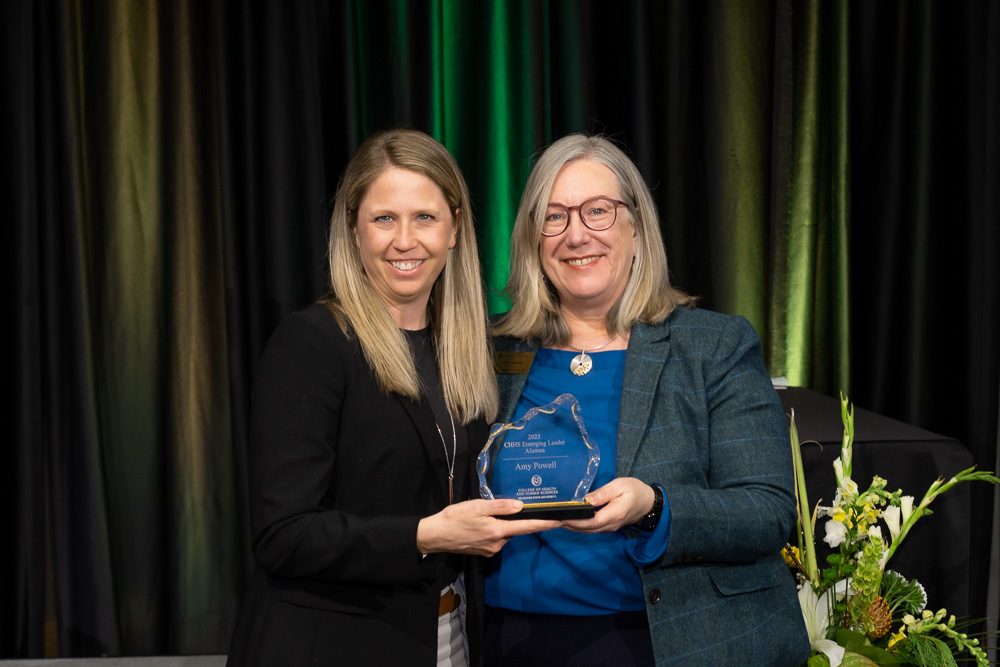
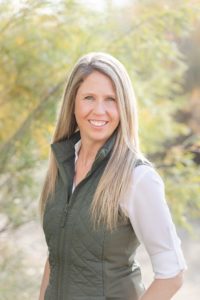
“Anyone and everyone has the opportunity to grow as a leader,” said Amy Powell (B.S., construction management, ’06; M.Ed., adult education and training, ’21). She speaks from personal experience: she has elevated her own leadership skills and empowers the same in others.
Powell was awarded the Colorado State University College of Health and Human Sciences 2023 Emerging Leader Alumna Award for her successful shift from 19 years working on construction projects to her current role leading innovative professional development trainings . “Amy’s most significant contributions to our industry are her advocacy for women in construction and for workforce mental health and well-being,” said her nominator, Paul Goodrum, head of the CSU’s Department of Construction Management.
The founder of Well Works, Powell has found her niche in providing construction industry professionals with mobile-based, micro-learning training modules to enhance leadership and communication skills.
Educational foundation
A first-generation college student from Silverthorne, Colorado, Powell went to college “because I thought I was supposed to,” as her parents had saved for Powell to attend. She left the state for her first year of college but returned to enroll at CSU. “I was going to explore architectural modeling, but then realized it was much more on computers, and I wanted to work with people,” she said. “An adviser mentioned the construction management degree, and I got excited. Right away, I wanted to know more.”

Powell realized quickly that most of her classmates had connections and exposure to the industry through family or personal work experience. Rather than see her newness to the field as a detriment, Powell dove into absorbing all she could. She confidently engaged her network around her childhood home in Summit County to secure an internship with a custom home builder – even though he had never hosted an intern before.
Powell also pursued department opportunities, such as the mechanical chapter student club, where she served as vice president and president. Attending competitions with the club led to a job offer from a specialty mechanical contractor without even submitting a resume.
Constructing a career
Her first professional role put Powell immediately in the field working on semiconductor facility construction for companies like Intel and Samsung. Moving every six months around the southwest was exciting: she and her husband, Matthew Powell (B.S., construction management, ’05) made a journey of the experience, living in a fifth-wheel trailer to facilitate their frequent relocations. The couple had met in the mechanical chapter and married in 2007.
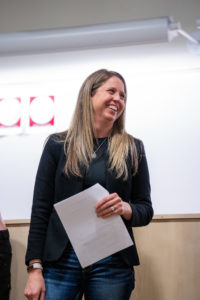
After a few years of these fast-paced roles, however, Powell longed to return to Colorado. To find her next employer, she went to the Department of Construction Management job fair website to explore the participating companies. She approached Brian Lartz, then-president of Golden Triangle Construction, who hired Powell to be a project manager. For nearly 14 years, she excelled in project management. However, Powell knew she didn’t want to be confined to office-based roles. Her heart was with the diverse workforce, with her boots on the ground.
The high-pressure of the fast-paced construction industry eventually began to take a toll on Powell. She still enjoyed the people and processes, but recognized she was reaching a level of personal burnout. She looked for resources to support her but didn’t find much understanding of the pressures of the industry. “I felt misunderstood,” she said. She sought leadership resources within construction and from other industries, but found they weren’t always applicable.

When Powell’s family grew with the birth of their two children, she tried being a stay-at-home-mom but found herself visiting the GTC office. Lartz encouraged her to come back to GTC part-time and build a training program for project managers and engineers. She trained people in the office and in the field. “I built PowerPoints, but didn’t feel good at it,” she said. “I could give them info, but they didn’t learn. I saw it as a reason to learn more about learning.”
Remodeling learning
Powell found the right fit with CSU’s School of Education, where she earned her master’s in adult education and training. “It opened my eyes to the barriers to training in construction,” she said. “I realized it wasn’t the technical skills we needed, but people skills.”
Although she originally envisioned returning to school in-person, her program was offered by CSU Online, which turned out to be revelatory. “I could choose when I was at my best and contribute to the class. It opened my eyes to the value and benefit of online learning. The whole thing was fantastic. I was the only construction industry person in the program, but I was able to apply everything I learned to the industry,” she said.
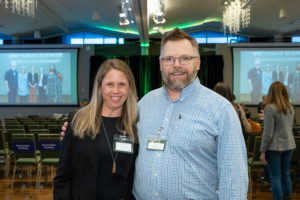
Assistant Professor Tobin Lopes taught her Workforce Development class. “From my first communications with Amy she was clearly and completely focused on developing herself in order to better develop others, particularly women and girls,” he said. “She was a great learner and consistently challenging herself and has become a great leader.”
“This is IT!” Powell said of Lopes’s class, which she had once dreaded. She knew she had found her passion when she asked Lopes, “Is it okay if my paper is longer [than the assignment called for]?” That assignment was the start of something special.
Well Works
Powell created Well Works Leadership Development Program with intention and focus over the course of a year. She realized it wasn’t the technical skills she was lacking as a trainer, but that the educational delivery needed to be tailored to the job site.
“On-site communication is much faster than in an office,” she explained of the real-time problem solving that occurs in the field. “And, you have a disparity in demographics, with Ph.D.s in engineering and people who may not have graduated from high school.” Non-verbal communication, math, spatial skills, and other intelligences are often used to bridge between education and language barriers.
Building her program to support training at any level of any construction company, Powell knew there wasn’t a single training tool or modality that would work. Well Works trainings are designed for “anyone who wears a hard hat,” but do not expect every participant to learn in the same way, or at the same pace. She optimized the program for trade and field, creating audio, video, and written content, parsed into 15-minute chunks.
Powell also took the learning environment into consideration. “Requiring training in-office for field people makes them come into an uncomfortable space,” she noted. “I decided to flip the classroom and take the training to them.” Well Works training content can be accessed in the field, which allows participants to engage with microcontent through the week, in the job-site environment where they can practice what they learn immediately. “Through the program, participants build their own leadership blueprint with their personal strengths as the foundation,” Powell said.
The Well Works Leadership Development program is self-paced. “This information is like water. You can’t drink all the water you need at the beginning of the week and be done. We intentionally space the learning out to avoid cognitive overload.”
Framing a leadership mindset
The program is also designed to support people at every level. “I don’t just provide support for people who want to climb,” Powell explained. “I approach leadership as a mindset, not as a title. You can be a servant leader, influencing, and being intentional to impact your team. No matter what pathway you took to get here, you have skills to share. You pick what tools to use in your situation, in your environment, and in your team.”
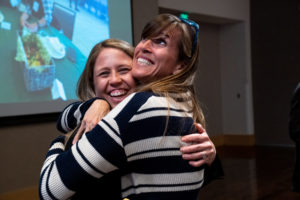
Powell’s ongoing engagement with industry associations and CSU’s Department of Construction Management leverages what she learned in her master’s program in the School of Education for the benefit of current students and construction industry members at all levels. In her newfound role as learning facilitator, she has found her experience makes her trustworthy to the audience of adult learners on job sites. “Nineteen years in the industry is more valuable in street cred than academic credentials,” she said.
Servant leader
“Amy has served as the vice president and secretary for the National Association of Women in Construction, which is the primary industry association for all women in the construction industry,” Goodrum noted. “In addition, Amy co-founded BuildHer Collaborative, which provides social support systems for women working in the construction industry or are considering entering into the construction industry. These types of support systems for women in construction are critical for both the recruitment and retention of women in construction.”

“Amy’s leadership is making a difference in the Northern Colorado Construction Industry in developing pathways to help make our regional industry more inclusive,” said Goodrum. “She annually volunteers for the Women in Construction Management Summer Institute, which is designed to allow females aged 15-16 a safe space to explore career paths in construction. She leads an activity that involves participants develop their ‘Personal Brand’ to help boost their self-confidence.”
Reflecting on her career path, lessons learned, and how to share them, Powell said, “I’ve learned so much from my failures – I love them!” Knowing what to wear in the construction industry was an early lesson Powell learned from her first industry mentor, the custom home builder where she interned. When she showed up for the interview in a suit, he said, “you aren’t going to wear that on the job site!”
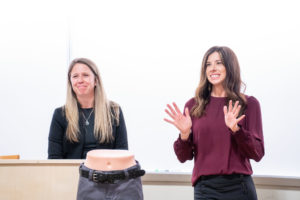
Now, Powell shares her hard-earned wisdom and tips of the trade with female students in the Department of Construction Management, like at the Women and Workwear event in March, with “industry sister” Alicia Ready (’08), who has taken the helm of BuildHer after co-founding the organization with Powell.
The Leadership Development Program is just the start of Powell’s Well Works offerings. She is planning new initiatives, including a short course for construction workers striving to move beyond a paycheck-to-paycheck lifestyle, and another for leaders ready for the challenge of learning how to teach, as she has.
Humble queen bee
Powell fills her free time with other passion projects. She and family are stalwart Rams fans: in addition to her husband, both of her sisters attended CSU. With her husband and kids, ages 8 and 9, she loves camping and “overlanding,” which is “backpacking in a vehicle.” And she pursues mixed martial arts training.
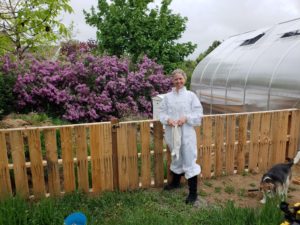
Powell also keeps bees on the family’s “mini-farm” and says the bees have taught her “a massive amount about leadership. The queen bee is not the be-all, end-all,” she said. This perspective is reflected in her key philosophy: “Be humble enough to say, ‘I don’t know everything; teach me.’”
“Invest in the people to improve the process,” Powell attested. “I don’t care what the process is – if you invest in the people, you will improve the process.”
Read about all College of Health and Human Sciences 2022-2023 award recipients.
The Department of Construction Management and School of Education are part of CSU’s College of Health and Human Sciences.